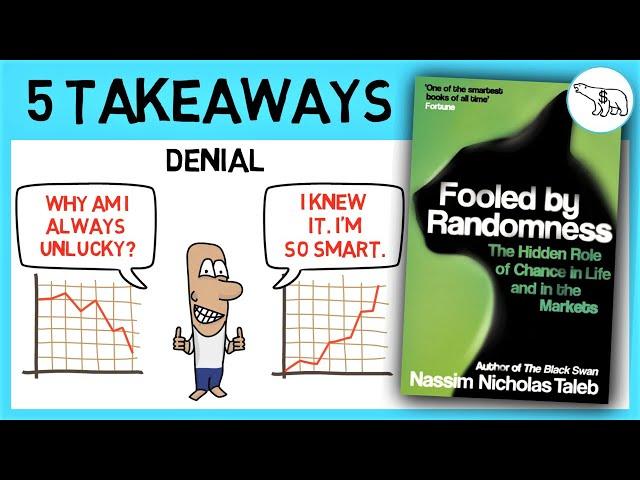
FOOLED BY RANDOMNESS SUMMARY (BY NASSIM TALEB)
Комментарии:

what a champion summary💪🏻
keep up the good work

You made the Swedish mafia the wrong color
Ответить
Great video.....
Ответить
Wait isn't the book, Taleb, and this video examples of what's taught in the book?
Ответить
A black swan just around the corner? No way! ... ah, Hello COVID.
Ответить
Good explanation thanks. The books was so painful to read
Ответить
What guff Taleb writes. Survivorship bias is not only the issue…. The fact is that the sample size of one is meaningless always. This is given the name SB by him wrongly. It’s sample size. Duh. He has massive Dunning Kruger because bankers are notoriously pants at science. His arm waving about SOME maths is so vague as to be valueless. He’s a fraud. HE has survivorship bias!
Ответить
Great video 👏💯👍
Ответить
When you say expectancy do you mean expected value?
Ответить
Watching this with Dark Mode, the BRIGHT WHITE SCREENS are overwhelming!
Note to developers: today's large screens encourage many users to use Dark Mode,
so try to avoid all-white, bright videos! - j q t -

This was published in April 2019. There was indeed a black swan was lurking around the corner.
Ответить
Excellent
Ответить
This convicted rapist can not be allowed to run for president. It's time for Biden to send in the FBI.
Ответить
Existence of black swans doesnt eliminate the fact that most swans are white.
Ответить
Thanks for sharing 🙌🌼🌹🌻🌺🏵
Ответить
Valley bank all those yrs ago... People with no collateral coming off ships just giving out loans? Still to this day? Probably not
Ответить
And only 3 years later we had 2 black swans: COVID and the Ukraine war.
Ответить
Ow!🙏👌
Ответить
I don't understand the skewness issue
Ответить
Just finished the book - The summary was much better than I expected , nice job keep doing sir !
Ответить
Just want to say thank you for your efforts- you have helped our family become investors. My children’s lives will be better because what we have learned from your analysis and method.
Ответить
It's very difficult to understand this book
Ответить
Good job ✌🏾 ✌🏾.... by far one of the best summaries of this book. 💯💯💯✔️✅.
Thank you n keep it up.

Interesting ideas. Better to watch this video than read his convoluted book.
Ответить
Note that Taleb himself suffers from a couple of misconceptions. He rants often about how debt is bad. He is right, debt is bad for households and firms. They want to be in surplus position (net savings). Taleb however has a distinctly neoclassical view of macroeconomics, so he fails to apply basic arithmetic on balance sheets, because he also regards government debt as bad. Well... you cannot talk out of both sides of your mouth! They cannot both be bad, because they are equal opposites: every dollar of government debt equals a private household or firm surplus, to the last penny. Basic sectoral balances (Charles Goodwin) absent rampant accounting fraud. Lesson: government deficits are good (up to sustainable energy full employment of idle resources limits), while government surpluses (tax return greater than government spending) are very bad and have always preceded the dozen or so major crashes (US data, but similar for all other major nations). The best historical account of this is Richard Vague's book A Brief History of Doom.
Traders who get paid to be right will always count on a bias toward increasing GDP when the government deficit rises. It is a simple rise in effective demand story (more sales, and firms avoid price hiking by bringing on idle capacity --- that is Alan Blinder's research). I have never heard Taleb acknowledge this, he always groans that government debt is unsustainable, when in fact government (currency-issuer) debt is the only debt that is forever sustainable, in perpetuity, government debt = private net dollar surplus, to the penny. You erase government currency denominated debt, then you erase private financial wealth. Their red ink is our black ink.
The only real debt of a government is the obligation to provide guaranteed employment for all workers that its tax liabilities caused to be unemployed. With full employment all the real goods that pensioners need are maximally available for sale, any involuntary unemployment (people seeking to earn a tax credit) is a waste of real resources, and essentially a human rights atrocity, it decreases the goods available for the elderly retired who are in the trust of the government. Compared to this injustice inflationary biases are trifling (and with a fiat currency inflation is just currency re-gauging, so is always sustainable provided the base minimum wage income retains equal purchasing power, then the real inflation rate is zero --- what matters is how much your entire income can purchase, not what $1 can purchase --- this is something inflation hysterics fail to grasp).
This of course (zero default risk for government) only strictly applies to a fiat non-convertible currency (aka. a tax credit money system). It is inapplicable to a commodity currency, since for a commodity currency the government debt is redeemable to gold (or the commodity) and so then national debt is a burden: on a commodity currency the government can be forced to default (which is essentially what Nixon did, or what any country that goes off the gold standard does, they default on prior obligations to convert to gold, as they probably should, because gold has superior engineering uses and should not be hoarded as a currency) and if they choose not to default when placed under creidt risk they have to either regressively raise taxes or raid pension funds. This is why you never want to use a commodity currency system, it is highly regressive, has a deflationary bias, and favours the rich over the poor and indebted.
The government cannot be forced to default on a fiat currency debt obligation (except at gun point). This is because a fiat currency acts as a mere numeraire for relative pricing, i.e., a record of units of credit and debt. The records are what are valuable, highly valuable, not the intrinsic currency. Taleb seems to not understand this, I think because he read too much Marx (Marx was writing in an era of gold standard adoption, and he failed to understand the underlying chartalist money system --- any nation finding itself in a major war would suspend the gold standard, revealing they were really chartalist all along).
Basically, I am waiting for Taleb to acknowledge MMT is correct (as a description of legal and institutional realities of most sovereign monetary systems --- tax liabilities drive demand for the otherwise worthless currency, not supply for the issuer.) When Taleb finally admits MMT was right all along, then my respect for him (which is already considerable) will immediately double. Not holding my breath though. Failed paradigms (here neoclassical and monetarist fantasy economics) die one funeral at a time, and Taleb is one of the holdouts. Correct me if I am wrong and show me where he has changed his tune on sovereign debt?

All true. But you are missing an even bigger fact many traders ignore, which is that pure financial trading is a negative sum game, you are not creating any real value, someone loses on every financial trade. The only ethical investor is one who invests in real goods production. Arbitrage is a fair exception, one can claim the arbitrage trader is helping to eliminate price mismatching, even if their motive is still pure greed. One thing all great economists agreed upon (the only thing they all agree on, including Marx and Hayek) is to "euthanize the rentiers." In a fiat currency tax-driven demand system the Treasury bond market really just has to go, it is a regressive anachronism --- basic income but only for people who already have money.
Ответить
👍
Ответить
such an awful theory. I really dont like the way he thinks or his market theory.
Ответить
Thank you Swedish investor ❤ 🤗😊
Ответить
5 traits are very interesting
Ответить
fools in a bull market believe themselves geniuses
Ответить
Thank you, 2-3 years since reading the book and good with a recap:)
Ответить
Great video. Now I don't need to spend hours reading the book.
Ответить
Guys read this book ASAP, it's fantastic, and in the trading domain, it's more impressive than The Black Swan book.
Ответить
Awesome book. Nicely explained. Thank you sir for sharing this.
Ответить
❤️
Ответить
❤️
Ответить
💖
Ответить
Just finished the book and this is a very well done summary!
Ответить
@theswedishinvestor - For take away no. 1 - How can we say that all 2.5% got higher returns, just by chance? can't it be like they had some SKILLS to identify and prefer Ericsson over SKF? Please enlighten..
Ответить
Very nicely made and informative videos, thank you. Which software do you use to make the videos
Ответить
It took me 30 mins to get through the video after hearing “Russian roulette with the Swedish mafia” was on the floor dying. 🤣🤣🤣
Ответить
Something I've always wondered about people who follow the experts is how they really don't think about long term realities. Let me pick out Warren Buffett, he will offer excellent investment advice, however how many of his devout followers have gone on to become billionaires? His investment advice is sound and I've used it, but am I a billionaire? This begs the question that perhaps a huge risk on my part can make me a billionaire as opposed to adhering to sound investment advice.
Seems like random luck could get you wherever you wanted to go quicker than prudent advice. Look at Elon Musk, he took enormous risks and is in higher cotton than Warren Buffett.

Regarding your intro to #3 the black swan problem:
It would actually probably be correct to argue that the Dow can't go down 23% in a single day. The S&P 500 circuit breakers would trip first and halt trading. Its far less likely than your example explained

"You never know, a black swan may be lurking around the corner" - spoken 2 years ago 😂
Ответить
Very very nice video sir 👌
Please make video on trading book summary


























